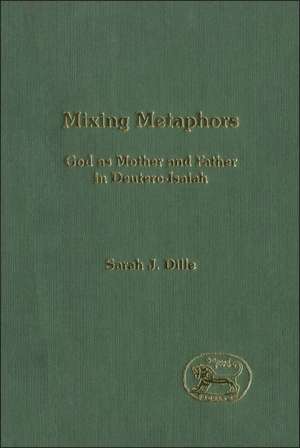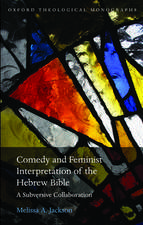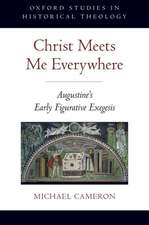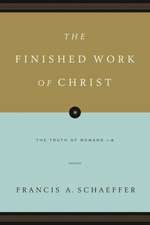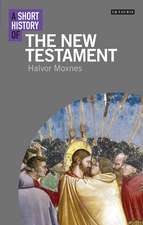Mixing Metaphors: God as Mother and Father in Deutero-Isaiah: The Library of Hebrew Bible/Old Testament Studies
Autor Asst. Prof Sarah J. Dilleen Limba Engleză Hardback – 30 iun 2004
Din seria The Library of Hebrew Bible/Old Testament Studies
- 30%
 Preț: 599.90 lei
Preț: 599.90 lei -
 Preț: 159.16 lei
Preț: 159.16 lei - 30%
 Preț: 541.20 lei
Preț: 541.20 lei - 23%
 Preț: 192.01 lei
Preț: 192.01 lei -
 Preț: 99.40 lei
Preț: 99.40 lei - 30%
 Preț: 509.52 lei
Preț: 509.52 lei - 23%
 Preț: 192.36 lei
Preț: 192.36 lei - 30%
 Preț: 509.93 lei
Preț: 509.93 lei -
 Preț: 222.84 lei
Preț: 222.84 lei -
 Preț: 168.53 lei
Preț: 168.53 lei - 30%
 Preț: 655.82 lei
Preț: 655.82 lei - 22%
 Preț: 568.27 lei
Preț: 568.27 lei - 23%
 Preț: 190.50 lei
Preț: 190.50 lei -
 Preț: 472.27 lei
Preț: 472.27 lei - 30%
 Preț: 665.45 lei
Preț: 665.45 lei - 23%
 Preț: 193.80 lei
Preț: 193.80 lei - 30%
 Preț: 656.06 lei
Preț: 656.06 lei - 30%
 Preț: 538.77 lei
Preț: 538.77 lei - 24%
 Preț: 508.76 lei
Preț: 508.76 lei -
 Preț: 168.75 lei
Preț: 168.75 lei -
 Preț: 472.22 lei
Preț: 472.22 lei -
 Preț: 172.88 lei
Preț: 172.88 lei - 30%
 Preț: 510.04 lei
Preț: 510.04 lei - 30%
 Preț: 893.55 lei
Preț: 893.55 lei - 30%
 Preț: 508.44 lei
Preț: 508.44 lei - 30%
 Preț: 598.02 lei
Preț: 598.02 lei - 30%
 Preț: 774.62 lei
Preț: 774.62 lei - 30%
 Preț: 509.52 lei
Preț: 509.52 lei -
 Preț: 470.74 lei
Preț: 470.74 lei -
 Preț: 170.01 lei
Preț: 170.01 lei - 30%
 Preț: 714.35 lei
Preț: 714.35 lei - 30%
 Preț: 773.71 lei
Preț: 773.71 lei - 27%
 Preț: 1122.64 lei
Preț: 1122.64 lei - 22%
 Preț: 1122.47 lei
Preț: 1122.47 lei - 22%
 Preț: 1125.50 lei
Preț: 1125.50 lei - 22%
 Preț: 1066.87 lei
Preț: 1066.87 lei - 22%
 Preț: 1121.17 lei
Preț: 1121.17 lei - 22%
 Preț: 1005.18 lei
Preț: 1005.18 lei - 22%
 Preț: 1123.94 lei
Preț: 1123.94 lei - 22%
 Preț: 1131.53 lei
Preț: 1131.53 lei - 22%
 Preț: 768.98 lei
Preț: 768.98 lei - 22%
 Preț: 1120.52 lei
Preț: 1120.52 lei - 22%
 Preț: 827.69 lei
Preț: 827.69 lei - 22%
 Preț: 889.49 lei
Preț: 889.49 lei - 30%
 Preț: 714.27 lei
Preț: 714.27 lei - 22%
 Preț: 1128.93 lei
Preț: 1128.93 lei - 22%
 Preț: 1125.82 lei
Preț: 1125.82 lei - 22%
 Preț: 1064.75 lei
Preț: 1064.75 lei - 22%
 Preț: 893.15 lei
Preț: 893.15 lei - 18%
 Preț: 384.21 lei
Preț: 384.21 lei
Preț: 1064.84 lei
Preț vechi: 1366.54 lei
-22% Nou
Puncte Express: 1597
Preț estimativ în valută:
203.75€ • 213.34$ • 169.00£
203.75€ • 213.34$ • 169.00£
Carte tipărită la comandă
Livrare economică 10-24 aprilie
Preluare comenzi: 021 569.72.76
Specificații
ISBN-13: 9780826471567
ISBN-10: 0826471560
Pagini: 216
Dimensiuni: 156 x 234 x 21 mm
Greutate: 0.45 kg
Editura: Bloomsbury Publishing
Colecția Continuum
Seria The Library of Hebrew Bible/Old Testament Studies
Locul publicării:London, United Kingdom
ISBN-10: 0826471560
Pagini: 216
Dimensiuni: 156 x 234 x 21 mm
Greutate: 0.45 kg
Editura: Bloomsbury Publishing
Colecția Continuum
Seria The Library of Hebrew Bible/Old Testament Studies
Locul publicării:London, United Kingdom
Recenzii
Review in International Review of Biblical Studies, Vol 51: 2004/05
"...Dille's study demonstrates how profitable, and indeed, necessary it is to study mixed metaphors. She has done a service to the study of biblical metaphors by directing future scholarship to new and rich areas for research." -Kevin Chau, Hebrew Studies, 2007
"Dille has given the scholarly community a great contribution in her call to properly understand metaphors in their historical context...Modern scholars surely need a reminder to avoid, as far as possible, overlaying modern associations onto ancient texts...the overall contribution of this monograph is very valuable...this monograph serves as a good reminder of the significance of metaphor in the Bible." -Charles Halton, Bulletin for Biblical Research 18.2, 2008
"Even though the overall contribution of this monograph is very valuable, a detailed examination reveals many areas that need strengthening. Dille's bibliography is rather thin, and she does not interact with some of the most important secondary resources that touch on topics that she discusses. For instance, Dille devotes an entire section to childbirth and parenting in the ancient Near East and Israel (pp. 24-29) but she does not cite perhaps the most relevant resource on this subject: M. Stol, Birth in Babylonia and the Bible (Styx, 2000)...In spite of these weaknesses..." -Charles Halton, Bulletin for Biblical Research 18.2, 2008
"Her analysis is exacting and her conclusions cogent. Both feminists and linguists will find this study quite interesting." - The Bible Today, Nov/Dec 2005
"By writing a book on parental metaphors for God, Sarah Dille participates in two current movements of biblical reinterpretation...I found her book both interesting and thought provoking with respect to these two currents of thought, as well as contributing to a better understanding of Deutero-Isaiah through study of these metaphors in their contexts." - Journal of Hebrew Scriptures, Vol. 5 (2004-2005)
"The greatest merit of this book is the author's awareness of the enormous potential the mixing of metaphors has as a deliberate ploy to simultaneously hint at and hide what cannot really be described. Her emphasis on the relevance of what she calls "associated commonplaces" for the understanding of metaphors is a welcome reminder of the fact that an ahistorical approach of the Bible is bound to create misunderstanding." - RBL, September 2005
"...Dille's study demonstrates how profitable, and indeed, necessary it is to study mixed metaphors. She has done a service to the study of biblical metaphors by directing future scholarship to new and rich areas for research." -Kevin Chau, Hebrew Studies, 2007
"Dille has given the scholarly community a great contribution in her call to properly understand metaphors in their historical context...Modern scholars surely need a reminder to avoid, as far as possible, overlaying modern associations onto ancient texts...the overall contribution of this monograph is very valuable...this monograph serves as a good reminder of the significance of metaphor in the Bible." -Charles Halton, Bulletin for Biblical Research 18.2, 2008
"Even though the overall contribution of this monograph is very valuable, a detailed examination reveals many areas that need strengthening. Dille's bibliography is rather thin, and she does not interact with some of the most important secondary resources that touch on topics that she discusses. For instance, Dille devotes an entire section to childbirth and parenting in the ancient Near East and Israel (pp. 24-29) but she does not cite perhaps the most relevant resource on this subject: M. Stol, Birth in Babylonia and the Bible (Styx, 2000)...In spite of these weaknesses..." -Charles Halton, Bulletin for Biblical Research 18.2, 2008
"Her analysis is exacting and her conclusions cogent. Both feminists and linguists will find this study quite interesting." - The Bible Today, Nov/Dec 2005
"By writing a book on parental metaphors for God, Sarah Dille participates in two current movements of biblical reinterpretation...I found her book both interesting and thought provoking with respect to these two currents of thought, as well as contributing to a better understanding of Deutero-Isaiah through study of these metaphors in their contexts." - Journal of Hebrew Scriptures, Vol. 5 (2004-2005)
"The greatest merit of this book is the author's awareness of the enormous potential the mixing of metaphors has as a deliberate ploy to simultaneously hint at and hide what cannot really be described. Her emphasis on the relevance of what she calls "associated commonplaces" for the understanding of metaphors is a welcome reminder of the fact that an ahistorical approach of the Bible is bound to create misunderstanding." - RBL, September 2005
